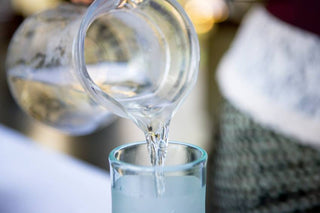Drinking water to curb weight gain is a simple, yet effective appetite control method according to a recent clinical trial.
“We are presenting results of the first randomized, controlled intervention trial demonstrating that increased water consumption is an effective weight loss strategy,” according to Brenda Davy Ph.D., senior author of the study.
The research was presented at the 2010 National Meeting of the American Chemical Society held in Boston earlier this month. The study was funded by the Institute for Public Health and Water Research, a nonprofit, independent science and education organization.
Dieters are often advised to increase their water intake to curb hunger pains and create a sense of fullness. Previous studies hinted that this might be true but were not considered the "gold standard" from a clinical perspective. In an earlier study, researchers found that middle aged-people who drank two cups of water right before a meal, consumed 75 to 95 fewer calories during that meal. This is the first study to offer scientific substantiation that water can promote weight loss.
In this recent study, 48 dieters, aged 55-75 years, were placed into two groups. Both groups ate a low calorie diet (1,200 calories a day for women; 1,500 calories a day for men) but only one group was instructed to drink two 8-ounce glasses of water prior to meals (3 times per day).
During the 12 week study, the water drinkers lost about 15.5 pounds whereas the non-water drinkers lost about 11 pounds. The dieters that consumed more water also kept the weight off for a full year after the weight loss study and even lost an additional 1 to 2 pounds. Conversely, dieters who didn’t load up on water prior to meals, gained about 2 pounds after a year.
Dr. Davy theorizes that the excess water helps to create a sense of fullness. This encourages dieters to consume less food and fewer calories. Additionally, drinking water instead of a sugary beverage has a favorable caloric impact.
Unfortunately, drinking water before meals may only work for middle aged and older adults. Dr. Davy cited an earlier study where 18 to 35 year olds who drank water before meals, did not cause them to eat fewer calories at mealtime.
One explanation may be in how quickly the stomach empties. In young people this occurs pretty quickly. With age, this process takes longer and may result in creating a sense of fullness longer.
The Bottom Line
According to national health statistics, the number one source of excess calories for Americans is sugar-laden beverages. These beverages are often consumed as a “single-serve” soft drink, juice, sweetened tea or other beverage. If you read the nutritional label more carefully, you’ll notice that most of these bottles contain several servings and if consumed all at once, can be upwards of 500 calories.
If these sugary beverages are replaced with high quality filtered water, then you’ll not only save calories and money but help the environment too. A small, daily change like this can add up to significant savings over time. In a year’s time, this could be the difference between gaining an extra ten pounds or maintaining your current weight.
While diet sodas and artificially sweetened beverages would probably work just as effectively as water, we recommend sticking with water. If you want to add flavor, squeeze a little lemon or lime into your water. Or, add a dash of lemonade to give flavor but add minimal calories.

